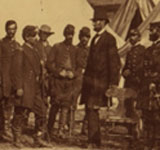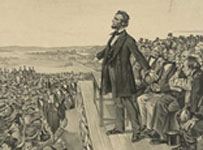
Recognition of Talent



As President, Lincoln surrounded himself with the best possible team of advisors. His Cabinet contained many people who were his political rivals, such as Secretary of State William Seward. For the most part, Lincoln was able to win over their loyalty and use their talent, even if some of them thought that they should be president. By the end of the war, Seward became Lincoln's most trusted advisor.
At the same time, Lincoln did not hesitate to get rid of people who were not talented. He fired a series of generals, including the popular George McClellan, in order to find the man who would fight the Civil War the way he wanted. However, he always left the specific day-to-day strategy to his generals, focusing himself on overall strategy.
More than anyone else in the country, Lincoln understood that under no circumstances could the South be allowed to leave the Union. He also knew that in order for the war to end, the South would have to surrender. It would only surrender if Robert E. Lee was defeated. Throughout the war, Lincoln kept the government and the army focused on inducing surrender. Everything he did, from promoting U.S. Grant to freeing the slaves, could be connected in part to his overarching goal of keeping the Union together.
Lincoln had a gift of instilling in the Civil War a higher moral purpose than merely keeping the country intact. His eloquence, or ability to make a speech, was a powerful weapon in maintaining national spirit. It provided for the Union a cause worth the sacrifice of so many lives. When Lincoln dedicated the national cemetery at Gettysburg he transformed the victory into a great sacrifice of Northern men dying so that the very concept of democracy could survive, or as Lincoln put it, "government of the people, by the people, for the people, shall not perish from the face of the earth." As famous as his Gettysburg Address is, Lincoln and many historians actually considered his second inaugural address to be his finest work. Few leaders have matched Lincoln's eloquence.